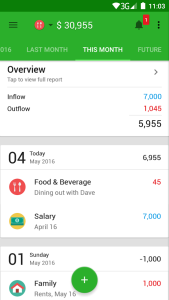Your time on JET will be a great opportunity for you to save a bunch of money if you choose to. Some JETs live paycheck to paycheck because they ball-out every 21st. Some people live paycheck to paycheck because they don’t have solid grip on their personal finances. Here are two bits of advice from the PAs about how to take control of your budget and have a little nest-egg for when your JET time is over.
Track your spending

It is easier to manage your budget, and thus to save money, when you have a clear idea of where your money is actually going. Use an app to track your expenditures and I bet you’ll have some interesting revelations about your spending habits. To the left is a screenshot of Money Lover, my preferred money application.
I was surprised to find that I usually spend between 7 and 8 man every month just to feed myself, and I don’t even drink Starbucks.
How much do think you spend on food? On entertainment? Track your spending for a month and see if you’re right!
“Off-the-top” saving
You will be paid more than enough to live on in Nagasaki. A simple (but not always easy) way to make sure you save some of that extra money every month is with the “off-the-top” saving method. Every payday, withdraw a sum of money from your account before you do anything (take it right off the top) and set it away for saving. I have a separate bank account just for that money I take out every month. Before I got that bank account I kept that money in an envelope in my desk.
I think that putting 20,000 yen away in savings every month is a good mark to hit. Of course, if that’s too much then saving any amount is better than nothing. I’ll leave the math to you but 20,000 yen a month over a year will add up to a nice pile of yennies to carry back home with you. Imagine what that account would look like after 5 years!
Check out our simple budget breakdown for how I came up with the 20,000 yen mark for saving and other expenses to expect when coming on JET. Please don’t limit yourself to saving either. We have some JETs in the prefecture that send money each month to retirement and investment accounts back in their home countries.
Yen Pinching
Long story short: Japan is a resource poor nation known for a high cost of living. Thus, anything using petroleum (and natural gas) for power costs higher than some other countries that subsidize these resources. Thus, schools will most likely not have air con and heat, and while your home will usually have one aircon unit in a single room, if you want to have money to save/spend you need to be smart about how you allocate your energy resources.
Consider using fans instead of aircon, as well as keeping windows open (with screens!). In the winter, using things such as kerosene heaters or kotatsu, as well as dressing for the weather (this is where heat tech comes in!), can save you a bit of money. Running an aircon unit constantly WILL run up your power bill.
http://www.survivingnjapan.com/2012/11/how-to-heat-your-home-and-stay-warm-in.html
http://www.survivingnjapan.com/2012/07/use-air-conditioner-japan.html
For food, it is cheaper to eat Japanese style more than “Western”. Things like rice, fish, seaweed, miso soup will be much less expensive than other meats, bread, grains, ect. Fruit is rather expensive in Japan as a rule, but those living in the inaka will probably be able to find cheap vegetables from local farmers and even fruit in season. You will learn to love to hate mikans especially. Canned fruit is also an option for those who need it. In Japan, most homes do not have ovens, so you need to be okay cooking primarily on a stove top, or getting creative with things like rice cookers and toaster ovens to prepare food. You can also invest in an oven/denshi range combo if you want to bake on occasion. [There are tons of resources on cooking Japanese food and making stuff in rice cookers, check out the home economics section of your school’s or city`s library!]
Foreign foods are imported and available in Nagasaki City, but they will be expensive. If you absolutely need a food, it is best to order online or make a trip to Costco in Fukuoka and buy in bulk.
And speaking of food, your school will occasionally have drinking parties for special occasions such as welcome parties, end of the year parties, farewell parties, ect. These events can add up, so don’t feel obliged to attend all of them (usually many of your schools with have drinking parties around the same times of year for welcome, end of the year, and farewell parties), but do remember they are a good chance to socialize with your co-workers. You may pay for each drinking party as it comes up (which can range from 3500 to 6000 yen, not including going out afterwards) or your school may collect money as a fund. Some schools also do collections monthly or yearly for things such as beverages for teachers in the kitchen (coffee and tea) so please ask someone at your school if you don’t know about any food/drink/drinking party fund collections.
For most of you, your predecessor left you everything you needed. But perhaps, you now want a fancy microwave to bake with or you find yourself in need of an actual bed instead of a futon. Or, for some of you, you moved into a new place that wasn’t furnished. Never fear! This is where recycle shops (in Japanese, リサイクルショップ) come in! Places like Off House (part of Book Off and Hard Off) and other local recycle shops tend to sell used items for a fraction of their cost when new, including furniture, clothes, electronics, instruments, etc. There are also Facebook groups for used goods (usually from departing ALTs) such as the Greater Kyushu Co-Prosperity Sphere.
